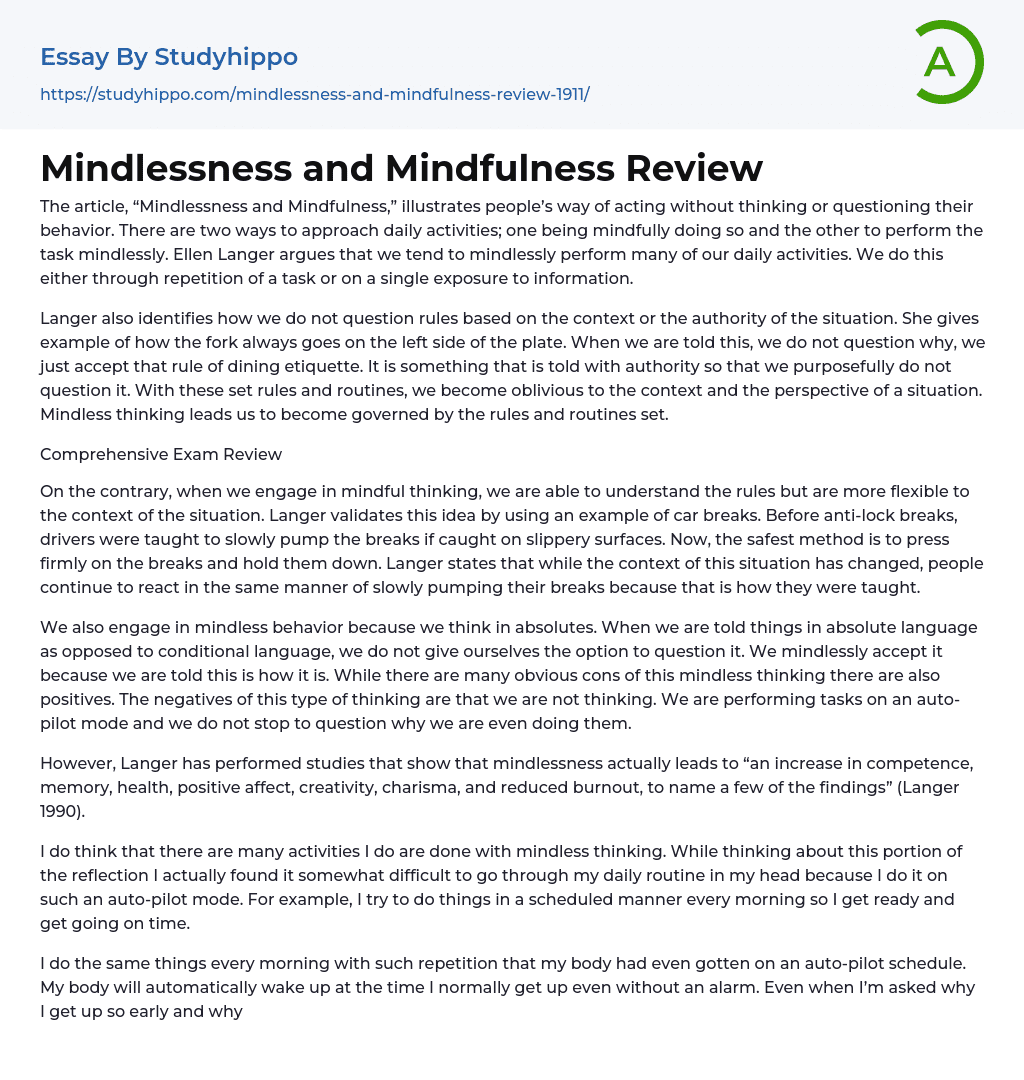The article, “Mindlessness and Mindfulness,” illustrates people’s way of acting without thinking or questioning their behavior. There are two ways to approach daily activities; one being mindfully doing so and the other to perform the task mindlessly. Ellen Langer argues that we tend to mindlessly perform many of our daily activities. We do this either through repetition of a task or on a single exposure to information.
Langer also identifies how we do not question rules based on the context or the authority of the situation. She gives example of how the fork always goes on the left side of the plate. When we are told this, we do not question why, we just accept that rule of dining etiquette. It is something that is told with authority so that we purposefully do not question it. With these set rules a
...nd routines, we become oblivious to the context and the perspective of a situation. Mindless thinking leads us to become governed by the rules and routines set.
Comprehensive Exam Review
On the contrary, when we engage in mindful thinking, we are able to understand the rules but are more flexible to the context of the situation. Langer validates this idea by using an example of car breaks. Before anti-lock breaks, drivers were taught to slowly pump the breaks if caught on slippery surfaces. Now, the safest method is to press firmly on the breaks and hold them down. Langer states that while the context of this situation has changed, people continue to react in the same manner of slowly pumping their breaks because that is how they were taught.
We also engage in mindless behavior because we think i
absolutes. When we are told things in absolute language as opposed to conditional language, we do not give ourselves the option to question it. We mindlessly accept it because we are told this is how it is. While there are many obvious cons of this mindless thinking there are also positives. The negatives of this type of thinking are that we are not thinking. We are performing tasks on an auto-pilot mode and we do not stop to question why we are even doing them.
However, Langer has performed studies that show that mindlessness actually leads to “an increase in competence, memory, health, positive affect, creativity, charisma, and reduced burnout, to name a few of the findings” (Langer 1990).
I do think that there are many activities I do are done with mindless thinking. While thinking about this portion of the reflection I actually found it somewhat difficult to go through my daily routine in my head because I do it on such an auto-pilot mode. For example, I try to do things in a scheduled manner every morning so I get ready and get going on time.
I do the same things every morning with such repetition that my body had even gotten on an auto-pilot schedule. My body will automatically wake up at the time I normally get up even without an alarm. Even when I’m asked why I get up so early and why don’t I just skip certain things for a day, I rationalize it by saying that’s what I always do and it will mess up my schedule. Then I drive to work on the same road at the same time every day.
I don’t even think about driving and suddenly I’m halfway there and I don’t remember the drive.
A perfect of example of my mindlessness while being in vehicles is when I was a passenger in my friend’s car and there was a car accident right in front of us. I didn’t see it happen. I was in my own world out of repetition of driving down the same road. Thinking about it, I notice that I engage in mindless behavior quite frequently.
I think there are many ways that we can become more mindful in our daily interactions. In social environments such as school and work, I think we are encouraged not to participate in mindful thinking because then we would question the things we are asked to do.
However, if we become open to new ideas, at work for example, we may find more effective ways of performing the same tasks that would actually be better in the long term. In social situation where we meet strangers, I think that we would learn new things if we were aware of different perspectives. We become so closed minded about our ideas that we don’t give ourselves the opportunity to be open to any others. We will not be able to progress as people or a society if we do not question our mindless, repetitive actions.
- Perseverance essays
- Expressive essays
- Character Traits essays
- Apology essays
- Compassion essays
- Adult essays
- Aggression essays
- Altruism essays
- Archetype essays
- Behavior essays
- Certainty essays
- Conformity essays
- Deception essays
- Human Behavior essays
- Human Sexuality essays
- Maturity essays
- Morality essays
- Obedience essays
- Procrastination essays
- Reinforcement essays
- Role Model essays
- Aesthetics essays
- Art History essays
- Artist essays
- ballet essays
- Body Art essays
- Color essays
- Concert Review essays
- Creativity essays
- Cultural Anthropology essays
- Ethnography essays
- Harlem Renaissance essays
- Heritage essays
- Modernism essays
- Mona Lisa essays
- Pastoral essays
- Postmodernism essays
- Realism essays
- Symbolism essays
- Theatre essays
- Visual Arts essays
- Voice essays
- Work of art essays
- Abnormal Psychology essays
- Abraham Maslow essays
- Attachment Theory essays
- Authority essays
- Behaviorism essays
- Classical Conditioning essays
- Cognitive Psychology essays




